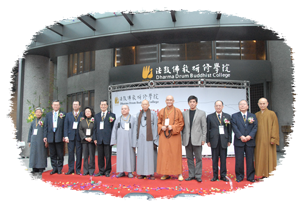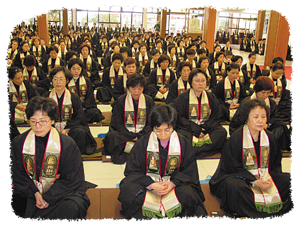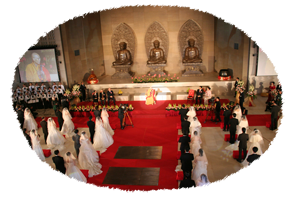The three types of education are all connected
◎ Master Sheng Yen
Dharma Drum Mountain’s vision and all the organization does is aimed to “uplift the character of humanity and build a pure land on earth”, and our core principle is “Protecting the Spiritual Environment”. DDM puts this vision into practice by means of the Threefold Education: Extensive Academic Education, Extensive Public Buddhist Education, and Extensive Social Care Education. Our current “Six Ethics of the Mind” and “Fivefold Spiritual Renaissance” campaigns both fall under our vision of Protecting the Spiritual Environment.
DDM is an institution dedicated to education, promoting a comprehensive education, entitled the Threefold Education. Apart from cultivating talent through Extensive Academic Education, DDM hopes to share the concept “Protecting the Spiritual Environment” and its approaches far and wide. Therefore our activities also include Extensive Public Buddhist Education and Extensive Social Care Education. In fact, the purpose of Extensive Academic Education is to train talented people to take on both Extensive Public Buddhist Education and Extensive Social Care Education. The three types of education are connected and interrelated like the links in a chain.
Extensive Academic Education—fostering top-level talent for specialized research, teaching, spreading Buddhism, and social services

Extensive Academic Education is the lifeblood of Buddhism. Master Sheng Yen once said, “If we do not start providing education today, Buddhism will have no future.” Only with sufficient numbers of qualified people can the Buddhadharma be passed on and spread far and wide.
This can be divided into two levels. The first is establishing secular and Buddhist universities. The former serves to foster leaders in various fields who will work to uplift the character of humanity and build a pure land on earth, based on the spirit of purifying people’s minds and society. The latter provides an excellent environment for Buddhist studies to educate and prepare highly-qualified researchers of Buddhism, inspiring academic circles and intellectuals at home and abroad to value Buddhist teachings and respect Buddhism, and will influence our twenty-first century world so that people will come to identify with and embrace the leading trend of “uplifting the character of humanity and building a pure land on Earth”.
The second level is the establishment of Dharma Drum Sangha University. This university will foster highly specialized monastics in the spirit of the religious masters, who are to take on the work of religious education, religious culture, guiding spiritual practice, and the management and promotion of religious affairs.
Currently Dharma Drum Buddhist College (DDBC) and the preparatory office of Dharma Drum University (Office of Planning)(*) are working together on the first endeavor, while Dharma Drum Sangha University is in charge of the second. Dharma Drum Buddhist College is the first Ministry of Education-approved mono-religious educational institute. Its forerunner is the Chung-Hwa Institute of Buddhist Studies, a highly experienced and well-equipped educational institution, which was founded in 1985. Having obtained official approval to establish a Buddhist studies department in 2007, we are now planning to develop DDBC into a Buddhist university. Founded in 2001, Dharma Drum Sangha University currently offers a Buddhist Studies Program, Chan Practice Program, and Monastic Education Program, with which it cultivates monastic talent for the diversified development of Buddhism.In addition we have established the Dharma Drum Humanities and Social Improvement Foundation and Sheng Yen Education Foundation in order to promote academic research and exchanges. The former mainly works to further exchanges in various disciplines in the Humanities and Social Sciences, while the latter focuses on the promotion of the thoughts and vision of Master Sheng Yen.
The specialization and institutionalization of Extensive Academic Education has enhanced the actualization of Extensive Public Buddhist Education, and Extensive Social Care Education, and serves as the foundation of DDM’s comprehensive education.
Extensive Public Buddhist Education —popularizing Buddhism by purifying the hearts and minds of the people, the social climate and customs
We promote Extensive Public Buddhist Education in the hope that in the process of contributing and taking part in our activities, participants may embrace the wisdom of Buddhism, develop a taste for life, and cultivate a sociable, pleasant and positive character, as well as develop a humble spirit eager to respect, forgive, help, and learn from others. This will serve to uplift their own character and will influence the people and environment around them. There are also two levels to this type of education:

The first is to apply several traditional Buddhist practice activities to help people purify their minds. For example, we offer elementary meditation introduction, beginners’ meditation classes, one-day, two-day, and seven-day Chan retreats for beginners, and seven-day, fourteen-day, and forty-nine-day Chan retreats for advanced practitioners, as well as the Dharma Drum Eight-Form Moving Meditation aimed at practitioners of all ages. There are seven-day Buddha-name recitation retreats, intensive one-day to three-day Buddha-name recitation retreats, Eight Precepts Observance, and group Buddha-name recitation activities. With regard to Dharma assembly and group practice we organize mountain pilgrimage practices, Great Compassion Repentance Ceremony, Dizang Repentance Ceremony, Guanyin Ritual, Liang Emperor's Repentance Ritual, Water and Land Dharma Service, and Offering for the Hungry Ghosts Service. Especially, the Water and Land Dharma Service combines an eco-friendly and artistic spirit, which not only accords with the core message of the Buddha, but also reflect a modern spirit, and so has become a landmark contemporary Dharma service.
In the second place, we also organize various modern cultural activities to popularize Buddhist teachings. Besides publishing various book series and audio-visual products, we also bridge the gap with society through the use of electronic, printed, and TV media, conveying the Buddhists’ concern for current social issues. We also regularly organize exhibitions on Buddhist arts and culture to give the public a better understanding of the Buddhist spirit. For our extended education programs, we have established the Sheng Yen Academy, which offers sequential and systematic courses on Buddhist teachings at our branch monasteries and practice centers all over Taiwan, giving the general public easy access to learning about Buddhism. Moreover, in response to the latest trends of digital era and the need for informatization, we have established the Dharma School, a DDM e-learning website. The diverse and practical courses offered by DDM community college are also well received by the general public.
Extensive Social Care Education—extending universal and equal loving care to the general public

Every phase and every aspect of a person’s entire lifetime deserves our care and concern. This extends from prenatal education beginning from the moment of conception, to the care for terminal ill and the newly deceased.
The two long-term major areas of Extensive Social Care Education are social relief work, and care for the terminal ill. Since the DDM Social Welfare and Charity Foundation was established in March 2001, the scope of social care activity has significantly expanded and increased. Both our efforts in disaster relief and social care visits to people in need have gained recognition and trust throughout society.
In addition, we regularly conduct a variety of activities based on the Four Kinds of Environmentalism, such as the Protecting the Spiritual Environment Experience Camp, and the Protecting the Spiritual Environment Train Series. We organize joint birthday celebrations for the elderly, joint weddings, and joint funeral services in the Buddhist spirit. Early in 2007 the Jin Shan Eco-friendly Memorial Garden was inaugurated. All of these represent our efforts toward actualizing the ideals of the Four Kinds of Environmentalism. The earlier we inspire the spirit of the young, the better, and therefore we especially emphasize, among many activities, educating children and young people. We hold several Chan meditation camps for young people and summer camps for school children every summer vacation.
Apart from regular activities, we also show our care and concern by appealing to all circles in society to respond to social problems. For example, in order to address the upsurge in suicides, we have organized a series of activities to urge people to cherish life, including the International Caring for Life Awards. Also, out of concern for the decline of ethics in our society, we have launched the Six Ethics of the Mind campaign. All of these activities demonstrate the relevance of our Extensive Social Care Education.
Promoting comprehensive education, putting into practice comprehensive care
As part of DDM’s common ethos our approach is “to promote comprehensive education, and put into practice comprehensive care”. This means that we fulfill the functions of education with care and concern, and accomplish the mission of caring through education. So we can say that DDM’s Threefold Education all falls under social care education.
Lifelong education is DDM’s educational goal, and so we encourage everyone to continue to learn and to keep making contributions all their lives, and to care for our world in the spirit of devotion and service. While caring for others, we continually reform ourselves, give of ourselves and grow, while at the same time conveying the vision of Protecting the Spiritual Environment to help others uplift their character. All of these aspects extend outwards in ever expanding circles, eventually turning our Earth into a pure land. Therefore, the interaction between education and social care is what characterizes Dharma Drum Mountain’s Threefold Education.
* On the 28th of July 2014, the Ministry of Education held a meeting to deliberate on the merging of the Dharma Drum College of Humanities and Social Sciences and the Dharma Drum Buddhist College. The merging of the two schools into the newly-formed Dharma Drum Institute of Liberal Arts.